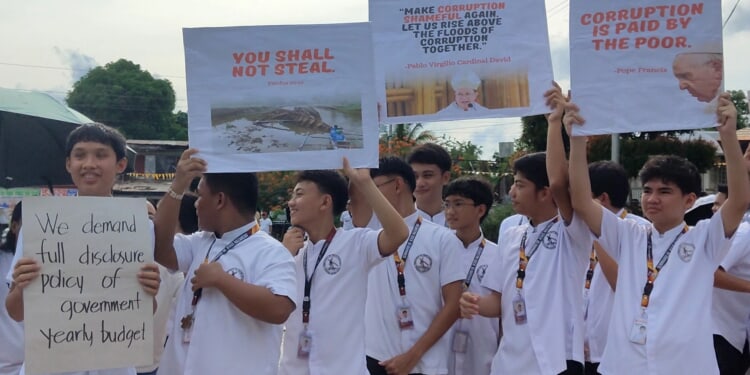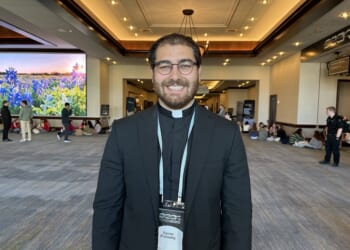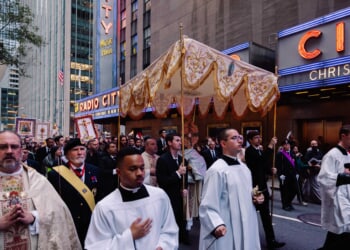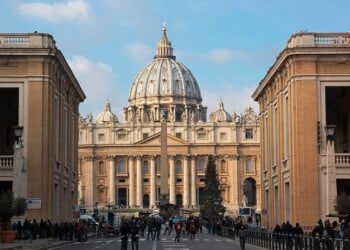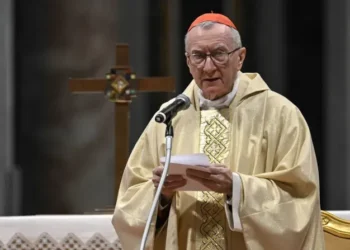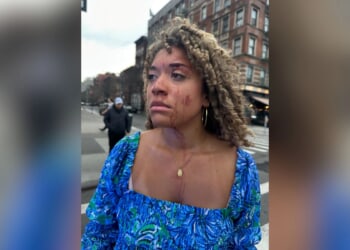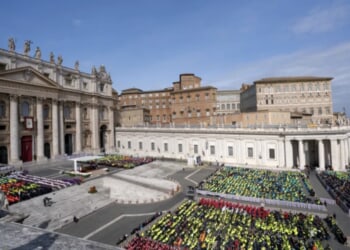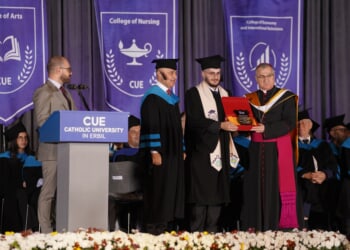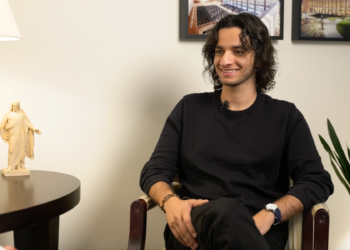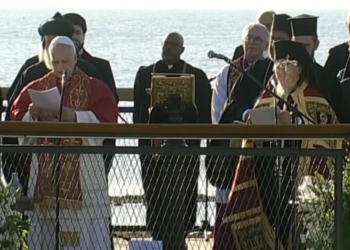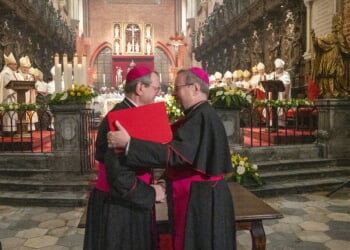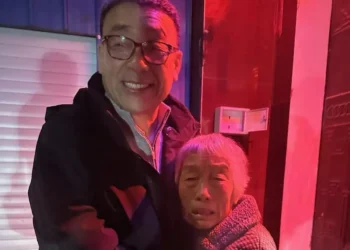Manila, Philippines, Oct 30, 2025 /
13:35 pm
A wave of corruption scandals has rocked the Philippines and triggered the country’s largest Church-backed protests in more than a decade. Philippine bishops have urged Catholics and others to persistently demand accountability and transparency from government authorities for the misuse of public funds.
On Oct. 26, Bishop Raúl Bautista Dáel of Tandag said that corruption in the country is a “serious issue” while celebrating the Marian feast of the Schoenstatt community in Talisay City, Cebu, in the central Philippines.
The prelate said corruption is “a system and a culture” that people have endured for a long time. He warned that every Filipino had become a complicit partner to it, either by cooperation or by silence.
Corruption must be addressed with courage, hope, and faith, Dáel said.
Additionally, Davao Archbishop Romulo Geolina Valles urged the faithful to fight corruption with grit and remain vigilant against it.
Valles, during a Mass on Oct. 25 in Davao, said that by robbing public funds supposedly used for government projects and services, corrupt officials and individuals have enriched themselves. Spending millions of dollars on poverty eradication, food security, infrastructure, employment, education, and home construction would have been beneficial.
A major challenge to overcome
The Philippines scored 33 out of 100 and ranked 114th out of 180 countries in Transparency International’s 2024 Corruption Perceptions Index (CPI). It is behind its neighbors — Singapore (84), Japan (71), and Malaysia (50). Since 2017, the score has remained between 33 and 36.
Corruption is a widespread problem in government and is embedded in daily civic life. It exists in bribery, graft, cronyism, embezzlement, nepotism, extortion, and fraud. Some examples of corruption include the misuse of public health funds, namely the PhilHealth system, and nonexistent infrastructure projects. This led to protests on Sept. 21, spearheaded by the Catholic Church, civil society groups, and youth movements.
Following the public protest, President Ferdinand Marcos Jr. created a three-member independent commission for infrastructure to probe anomalies.
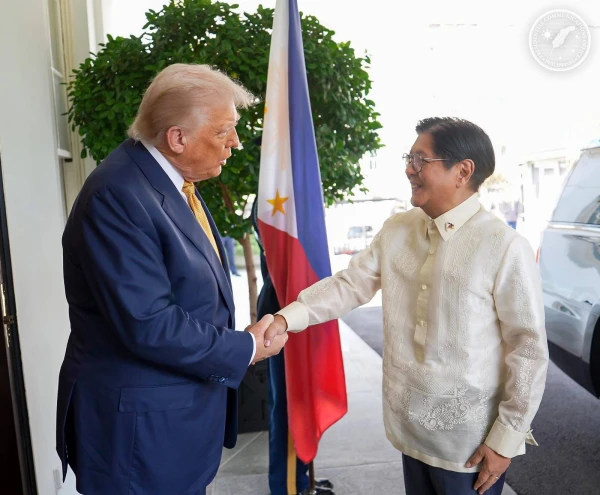
The economic impact of corruption affects governance efficiency, creates an uncertain business environment, and is a potential cause of poverty. As a social impact, corruption diminishes public trust in government and deprives the public of services.
Meanwhile, Marcos assured the public that legal and institutional frameworks are in place to address corruption.
Moreover, the media, Church organizations, and civil society groups have intensified their efforts to expose corruption issues.
The Church’s role as a moral force
Cardinal Pablo Virgilio S. David, the president of the Catholic Bishops’ Conference of the Philippines (CBCP), compared corruption to a cancer afflicting the country.
(Story continues below)
Subscribe to our daily newsletter
Catholics and citizens are called to “participate, scrutinize, and hold the government accountable, without which corruption spreads unchecked,” he added.
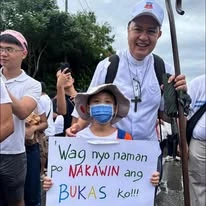
“With such efforts, the nation has a fighting chance at recovery and has the potential for healing our democracy,” he said in a social media post on Oct. 28.
With people’s sustained participation, informed vigilance, and creative collaboration, along with research, digital platforms, and public engagement, it is possible to combat greed and impunity, David said.
“Corruption weakens the nation through silence and inaction. The Church serves as a beacon of morality by speaking out against corruption,” Niel Anthony Borja, a senior lecturer at the University of the Philippines Diliman-College of Law, told CNA.
When Church leaders call corruption a moral wrong, they help restore public trust and accountability. The late Cardinal Jaime Lachica Sin, archbishop emeritus of Manila, once did so, condemning corruption, authoritarianism, and human rights abuses under the Ferdinand Emmanuel Edralin Marcos Sr. regime. Sin’s leadership empowered citizens and inspired reform.
“By speaking truth to power, the Church keeps the nation’s conscience alive,” Borja added.
Allies in the fight against corruption
The Catholic Church networked with others in combating corruption.
“The collaborative and collective efforts among churches and the Catholic Church, leading as a moral force to fight corruption, have stirred a synergy of actions and reactions,” Sister Liza H. Ruedas, a member of the Daughters of Charity Justice, Peace, and Human Rights Commission, told CNA.
Many initiatives have been undertaken to address corruption among political leaders, including protests, prayer rallies, forums, education, and awareness-raising mobilizations, aimed at galvanizing citizens and drawing strength from mutual support.
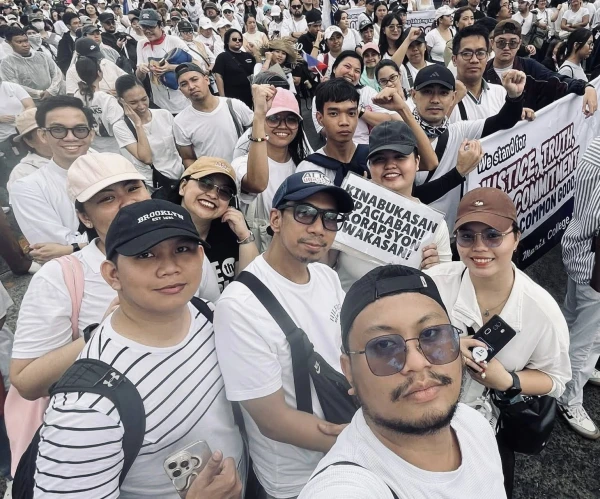
There is a broad push across Catholic organizations and institutions toward addressing these issues: The Conference of Major Superiors of the Philippines, Simbayanihan — the social action arm of the CBCP — Caritas, and Justice and Peace groups link together to promote advocacy and citizen participation.
“With what is happening in our country at present, it is imperative that we draw inspiration from our faith and recall our responsibilities as Christians. Compassion must guide us, compelling collective action against the corruption that has brought our government to the brink of moral collapse,” Associate Professor Gerlie Caspe-Ogatis, a faculty member of the College of Arts and Letters, Philosophy Department, Polytechnic University of the Philippines, Manila, told CNA.
“Indeed, the shameless behavior of many politicians and their displays of excessive greed reveal a profound disconnect from genuine religious practice,” said Caspe-Ogatis, who is also managing editor of Mabini Review Journal.
“The Church must take a firm stance, reminding the faithful that authentic Christian living entails a profound awareness of and concern for the suffering and welfare of others.”

